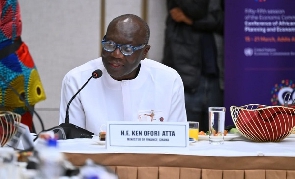Business News of Monday, 27 March 2023
Source: classfmonline.com
US$1.7 billion debt relief: We will help you – China to Government of Ghana
The government of China says it will help the government of Ghana to restructure the gold-producing West African country’s US$1.7 billion debt owed the Asian giant.
Chinese Finance Minister, Liu Kun gave the assurance when Ghana’s Finance Minister, Ken Ofori-Atta, led a delegation to Beijing to ask for debt relief.
“China believes in promoting debt sustainability and sustainable development,” Mr Liu said, adding: We know that these are short-term challenges which we, as responsible creditors, remain committed to resolving”.
“The long-standing and prosperous relationship between Ghana and China imposes on us, a responsibility to help”, Mr Liu noted.
He indicated: “Chinese authorities have confidence in Ghana’s economic management and its long-term economic viability.”
Ghana is seeking debt relief and restructuring as a prerequisite to getting the Board of the International Monetary Fund to approve a US$3-billion extended credit facility for the cocoa producer.
The US$1.7 billion owed China is part of the US$5-plus billion Ghana owes its bilateral partners including the Paris Club.
Ghana has already finished restructuring its domestic debt.
US$3bn bailout: ‘Give Ghana necessary financing assurances as soon as possible’ – IMF tells China, Paris Club
A few days ago, the IMF urged Ghana’s creditors to hasten to grant the financing assurances needed promptly so the Board of the Bretton Woods institution can approve the $3-billion facility to restore economic stability to the country.
“We're calling on bilateral creditors to support Ghana's effort to restore debt sustainability, form an official creditor committee, and deliver the necessary financing assurances as soon as possible”, the Fund’s communications director Julie Kozack told journalists at a news briefing in Washington DC.
A questioner has asked: “Ghana's president has said he expects the programme request to go to the IMF Board by the end of this month. Is that realistic? Can you give us an update on that?”
Ms Kozack answered: “So, on December 12th, 2022, the IMF reached a staff-level agreement with Ghana on a three-year programme supported by an arrangement under the ECF. This programme was worth about $3 billion”.
“Ghana also requested a debt treatment under the G20 Common Framework”, she noted.
She said: “Financing assurances from partners and creditors are necessary for presenting the programme request to the IMF's Executive Board for approval”, adding: “We continue to engage closely with the Ghanaian authorities while they seek these assurances”.
The IMF programme, Ms Kazack indicated, “aims to support Ghana's efforts to restore macroeconomic stability, debt sustainability while also protecting the vulnerable, preserving financial stability, and laying the foundation for strong and inclusive growth”.
A few weeks ago, President Nana Addo Dankwa Akufo-Addo said his government is “making progress on the external debt negotiations” with its development partners “since the government announced an external debt service suspension on 19th December 2022 for certain categories of external debt, to ensure an orderly restructuring”.
The suspension, the president told parliament in his state of the nation address on Wednesday, 8 March 2023, “is an interim emergency measure toward a comprehensive external debt operation which will contribute to the restoration of our debt sustainability in line with our request for a debt treatment under the G20 Common Framework”.
“I want to express our appreciation to the members of the Paris Club and to the Peoples’ Republic of China for the cooperation they have, so far, exhibited to us in attempting to reach an agreement, and in their attempt to establish an Official Credit Committee”.
“We look forward to their fast-tracking the needed financing assurances for IMF approval. We are confident that, with their cooperation, we will reach our March deadline for going to the Fund”, he said.
Ahead of the Chinese government’s pledge to help, Mr Ofori-Atta had said his meeting with China on Ghana’s external debt restructuring programme is has been very good so far.
Announcing progress of the talks with China, Mr Ken Ofori-Atta’s office tweeted: “So far had very positive and encouraging meetings in China! Looking forward to securing external assurances very soon, even as we pass our outstanding domestic revenue bills back home. Great progress on all fronts…#ResolvingTogether #GhanaFirst”.
In a related development, the IMF has advised African countries to take into consideration, the effects their debt restructuring programmes could have on the domestic banking sector.
At the 2023 Oxford Center for the Study of African Economies Conference at St Catherine’s College, Oxfordby, Mr Abebe Aemro Selassie Director, African Department of the IMF, said: "For cases where debt is unsustainable, it goes without saying that it needs to be restructured".
In such cases, he said "the burden of making repayments should not fall unduly on debtor countries".
"But this is easier said than done", he admitted, saying: "Debt restructurings have always been difficult, and even more so now in the context of a more diversified creditor base and more complex structure of public debt.
"Take domestic debt, which now accounts for about half of all public debt in sub-Saharan Africa."
"In cases where public debt is unsustainable and this exposure needs to be included in the restructuring perimeter, careful consideration needs to be given to the effects on the domestic banking sector, how quickly market access can be regained etc", he advised.
"And with respect to external creditors, countries of course have even less sway over the pace at which restructuring can happen, as clearly shown by the ongoing challenges with the Common Framework".
This, he noted, "is even more frustrating in unsustainable cases where the official creditors’ inability to agree on a needed debt treatment prevents the IMF from providing timely support to countries during periods of acute distress".











